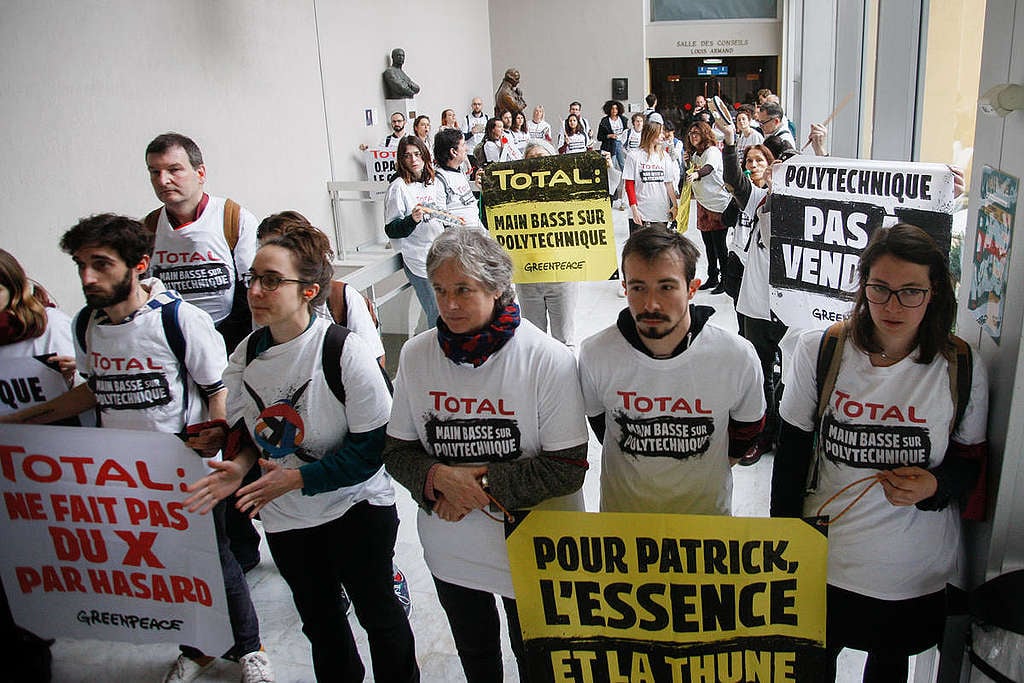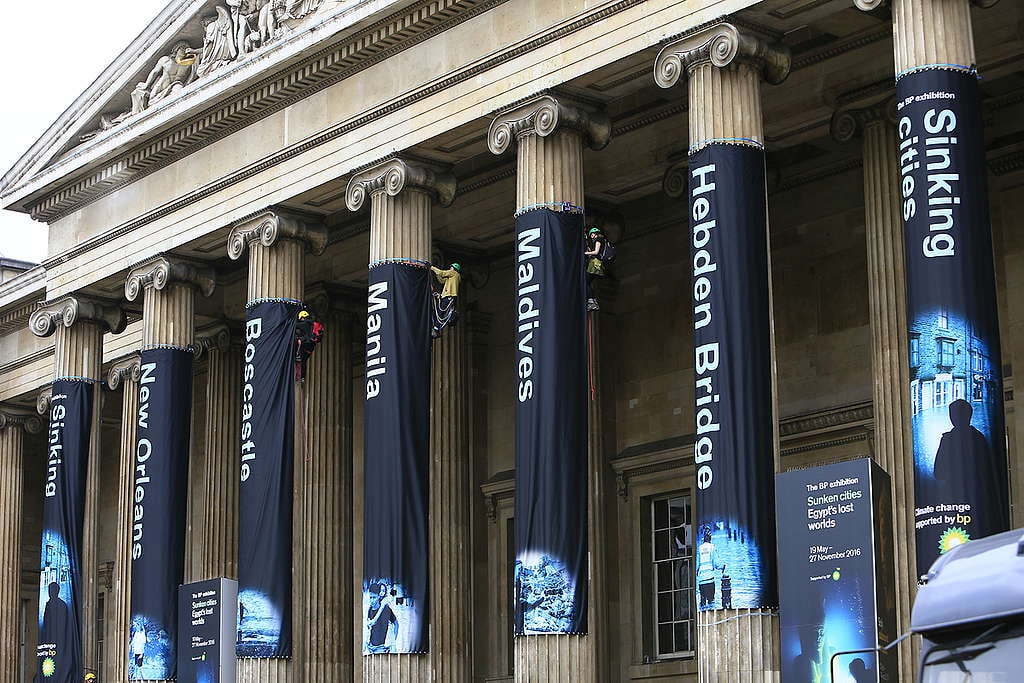For decades, oil, coal and gas companies have, with impunity, manipulated all the levers of influence they could to convince us of the necessity of their climate-wrecking economic model. This is known as soft power.
As opposed to hard power, soft power is a more insidious way to impose dominance. This is not about winning the game through force but changing the rules because you’ve made yourself the referee. It’s about political coercion, social manipulation, and cultural appropriation.
The fossil fuel industry has spent billions to control the climate change conversation. Today they are trying to rebrand themselves as part of the solution to the climate crisis, crisis they are responsible for causing. This power goes beyond their influence over lawmakers and public policy, it is about perpetuating their social license to continue business as usual. The presence of the fossil fuel industry is a pervasive part of our daily lives.
Education
Fossil fuel companies are spending big money to shape how the youth is educated about the climate crisis. For example, by trying to convince schoolkids and students that fossil fuels, like gas, are a solution to the climate crisis. In several countries, including Canada and the United States, workbooks and workshops sponsored by the oil and gas industry have made their way into the school curriculum.

In April, 2021, Greenpeace France together with anti-corruption group Anticor and the student association La Sphinx cited Total’s CEO Patrick Pouyanné for conflict of interest in pushing the company’s fossil fuels agenda through the prestigious French technology and science university École Polytechnique. Evidence indicates that Pouyanné used his position as a member of the Board of directors of the Polytechnique to influence, on behalf of Total, the Board’s decision to establish a research and innovation center for the company Total, in the heart of its campus.

Whether it’s in Myanmar, Uganda, Tanzania or France, Total continues to pursue its climate-killing agenda and is ready to wield soft power to maintain the social acceptability of its dirty business.
The good news is that new generations of students are increasingly reluctant to work in the fossil fuel sector and support the vested interests of such companies. Some universities still have strong ties to the oil industry. Universities and college endowment funds control hundreds of billions of dollars worth of investments, much of it still supporting the industries posing a direct threat to our future. But the movement to divest those funds from fossil fuels is gaining momentum.
Sports
Oil and gas companies are particularly keen on trying to influence young people and pull in young talent, even if they have to disguise what they are really up to and hide behind a brand change.
Russian majority state-owned multinational energy corporation Gazprom has been an official partner of the UEFA Football Champions League since the start of the 2012/2013 season. It is organizing the Football for Friendship program “to unite young generations and promote essential human values whilst raising awareness of important topics, like gender equality in sport and the wellbeing of our planet”. Coming from such a big polluter, that is cynicism in the extreme.
To greenwash its reputation, UK oil gas and petrochemical conglomerate Ineos, who has lobbied to weaken green taxes and reduce restrictions on fracking, signed a six-year deal with New Zealand’s rugby team. Oil major Total, who recently changed its name into Total Energies is now officially sponsoring the 2023 Rugby World Cup, which will take place in France. Again, companies responsible for driving us deeper into the climate crisis and fouling the oceans with plastic pollution are buying themselves a fig leaf of respectability.
A few weeks ago, in Tokyo, the climate crisis took centre stage at one of the hottest Olympics on record. The athletes’ suffering was palpable. What future awaits the Olympic Games in our increasingly hotter world? There are no sports on a dead planet.

Culture and the arts
Oil companies are also buying their way into cultural institutions such as museums and art galleries to showcase false solutions to the climate crisis. Without any sense of irony, Shell is sponsoring the British Science Museum’s Our Future Planet exhibition, which explores false solutions to remove carbon dioxide from the atmosphere.
One of the conditions for sponsorship was that the British Science Museum had to sign an exhibition sponsorship contract with Shell in which it agreed not to criticise the company. Shell seems to believe that looks are the only thing that matters: this year, the British-Dutch multinational oil and gas company headquartered in The Hague is investing more money in marketing than renewable energy (and five times more money in oil and gas than in renewable energy).
BP ended its controversial sponsorship of Tate in 2017 after nearly three decades. The museum of the Louvre, located in Paris, is still in a partnership with Total Energies.

ExxonMobil is known as one of the most charitable corporate donors on the planet. In 2017, worldwide corporate and ExxonMobil Foundation contributions supporting arts and cultural programs totaled more than $2.8 million. Of course ExxonMobil is first and foremost one of the world’s biggest polluters, rightfully criticized for its slow response to cleanup efforts after the 1989 Exxon Valdez oil spill in Alaska, considered to be one of the world’s worst oil spills. The image of Exxon as a kind and generous benefactor shouldn’t make us forget that the company has an appalling history of lobbying for climate change denial against the scientific consensus that global warming is caused by the burning of fossil fuels.
Plastering an oil company’s logo on the wall of an art museum is by no means harmless. The wider influence of the fossil fuel industry on culture and charities is a problem, especially when it leads to censorship of works related to our planetary emergency. Let’s get oil sponsorship out of the arts once and for all.
What needs to happen
The oil and gas sector is losing its social licence to operate. Fossil fuel companies know that the tide is turning, that they are increasingly being held accountable for the damage they have done, and that the age of fossil fuels is coming to an end. To protect their interests, fossil fuel companies will keep trying to extend their hold and influence on all levels of society.
In an age of climate crisis, we must shun any form of fossil fuel advertising, sponsorships and influence. As long as coal, oil and gas companies benefit from the shiny glow of important schools and cultural institutions, they will continue to maintain their outdated business model and refuse to treat the climate crisis like the emergency it is.
Just as tobacco manufacturers misled people about the link between cigarettes and cancer, fossil fuel companies are using advertising and sponsorships to distract, deflect and delay. Their climate disinformation and greenwashing delay the climate action we so badly need. The sooner we take the microphone away from them, the faster we will be able to make them change their harmful ways of working and start a green and just transition for real.
about the author
Mehdi Leman
Mehdi Leman is a content editor for Greenpeace International based in France.

No comments:
Post a Comment
Note: Only a member of this blog may post a comment.